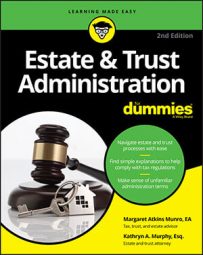The American Taxpayer Relief Act of 2012 (the Act), fondly known as the "Fiscal Cliff Act," contains a number of provisions affecting estates and trusts. It makes permanent a number of expiring tax provisions and revives others that had already vanished. Here's a breakdown of what you need to be concerned with as the fiduciary of an estate or trust.
Top marginal rate
The Act permanently increased the top marginal federal estate and gift tax rate from 35 percent to 40 percent. Previously, the top marginal rate had been set to revert to 55 percent for decedents dying in 2013 and beyond.
Exclusion amount
The amount that can be excluded from federal estate and gift taxation has been set by the Act at $5 million, adjusted annually for inflation. For 2013, it's $5.25 million. Prior to the Act, the exclusion amount had been set to revert to $1 million in 2013.
Portability of the exclusion amount
The Act makes permanent the ability to elect to transfer any unused estate and gift tax exclusion amount to the surviving spouse. So if the decedent doesn't have a taxable estate but the surviving spouse has or may have a taxable estate, Form 706 is filed for the decedent electing to transfer the unused exclusion amount to the surviving spouse. The amount transferred to the surviving spouse is called the deceased spousal unused exclusion (DSUE).
The executor of a decedent's estate can elect transfer, or portability, of the unused exclusion to the decedent's surviving spouse, but he or she must do so on a "completely and properly prepared" and timely filed estate tax return. The surviving spouse can later apply the DSUE amount received from his or her last deceased spouse against his or her own subsequent lifetime gifts and transfers at death.
The IRS recognizes that preparing and filing Form 706 when you wouldn't otherwise have to is a burden and has said that, in valuing the property for inclusion on a return that's being filed solely to elect the transfer of the DSUE, the executor may estimate the total value of the gross estate based on a determination made "in good faith" and "with due diligence" regarding the value of all of the assets includible in the gross estate.
Deduction for state death taxes
The Act permanently extends the deduction for state death taxes that was created in 2005. Before 2005, decedents received a credit against their federal estate tax for any state death taxes paid. In 2005, the credit was eliminated and decedents were granted a deduction instead.
Generation-skipping transfer taxes
The generation-skipping transfer (GST) tax is a relatively new invention intended to ensure that the federal government gets its slice of the pie each and every time assets move from one generation to the next. As a result of more and more people discovering that they may be able to pay less overall transfer tax by bypassing their children and giving property directly to grandchildren (or even better, great-grandchildren), Congress plugged this particular loophole so that the gift tax and estate tax can no longer be evaded at any generational level by skipping a generation on the transfer.
So now rules trigger the GST tax any time a transfer is made that skips a generation, with the exception of transfers made into irrevocable trusts (trusts that can't be amended) created before September 25, 1985, which are "grandfathered" from the GST tax. The Act extends several GST tax provisions that would otherwise have expired at the end of 2012, all of which are quite technical.
Income tax rates
The Act extends the top marginal income tax rate for estates and trusts to 39.6 percent in 2013 (from a 2012 maximum of 35 percent). Estates and trusts continue to reach the highest marginal rate much faster than individuals, hitting the ceiling at a princely $11,950 of taxable income in 2013 (adjusted annually for inflation).
Capital gains and dividend tax rates
For top-bracket trusts and estates, the maximum capital gain and qualified dividend tax rate permanently rise to 20 percent in 2013, up from a maximum of 15 percent in 2012.
Alternative minimum tax
Everyone was hoping that the alternate income tax would be repealed entirely, but no such luck. The alternative minimum tax (AMT) has been permanently embedded into the Internal Revenue Code. There is good news, though: The exemption amounts available for all taxpayers, including estates and trusts, are now automatically indexed for inflation each year.

